- Home
- Howard Marks
Mr Nice Page 6
Mr Nice Read online
Page 6
The fame of this dope-smoking haven, enshrined and protected by College and University, had spread far and wide. The occasional student visitor from the Sorbonne or Heidelberg would show up, as would the odd member of the embryonic London underground. Marty Langford, who was studying art, and a few other Kenfig Hill friends dropped in. Even John Esam, one of the beat poets who had performed at the Royal Albert Hall’s Wholly Communion, graced the premises with his presence. He turned up unannounced in my room and offered to sell me some LSD, which I had never heard of. Each dose was in the form of a drop absorbed by a sugar cube. The cost of each treated sugar cube was £3. John Esam told me that it was like hashish, but infinitely more powerful and not the least bit illegal. He was telling the truth on both counts. I purchased a few cubes and stored them away for use on another day. I made enquiries among my friends. A few had heard of LSD, but none had taken it nor knew anyone who had. It was all very mysterious. Someone said that LSD was like mescaline, which Aldous Huxley had written about. Someone else said that a Harvard scientist, Timothy Leary, had experimented with LSD and written about it.
About a week or so later, I was invited by Frances Lincoln, a vivacious Somerville student, to come to her rooms for tea. On the strangest of impulses, I decided that this would be an opportune moment to take one of the sugar cubes, and I ate one about an hour or so before my appointment. No discernible effect had occurred by the time I left Balliol, and when I reached Somerville I concluded that I must have been well and truly conned into the purchase of this so-called wonder drug. Halfway through eating my teacake, the effects suddenly hit me. The pictures on the wall came to life, the flowers in the vases breathed heavily and rhythmically, and the Rolling Stones record that was being played sounded like a Handelian heavenly choir singing to the accompaniment of African tribal drumming. It was impossible to explain to Frances what was happening inside my head, but she was politely intrigued by my descriptions. When the four Beatles on the front of the album cover of Please Please Me jumped up and played, I said I ought to leave. Frances escorted me back to Balliol and left me at the front gate. I wandered around the quads and the Junior Common Room in a giggling stupor. Fellow students were used to seeing me in various states of intoxication, and I doubt if my condition occasioned any alarm. At about midnight, a full eight hours after ingesting the sugar cube, the effects wore off, and I went to bed.
The next few weeks, spent partly in Oxford and partly in Wales, were devoted to finishing off the sugar cubes. Several friends joined me in this experimentation. John Esam came again, and I purchased more sugar cubes. I took one which resulted in what came to be generally known as the ‘horrors’. These are extremely difficult to describe. Instead of finding the LSD experience an amusing, interesting, thought-provoking state of instant Zen, replete with benign and wondrous hallucinations, one finds it frightening and grave, and one experiences instant psychosis. Flowers no longer gently breathe. They turn into werewolves and bats. The hallucinations turn into menacing demons. It’s not funny, and I became uncharacteristically depressed and perturbed about the meaning of life, its futility, and my identity. Although the severe effects wore off after the usual time period, the problems they caused remained. I was convinced that the only way to resolve these problems was to take more LSD and try to come to grips with whatever was disturbing me. This didn’t work. The ‘horrors’ continued to manifest themselves in diverse forms. Between acid trips I read anything I thought remotely relevant to the LSD experience: Aldous Huxley’s Heaven and Hell, Doors of Perception, and Island; Evan Wentz’s translation of The Tibetan Book of the Dead; Sydney Cohen’s Drugs of Hallucination; and Timothy Leary’s The Psychedelic Experience. None of these did anything to dispel the intense depression I was suffering. I became unusually introverted, morose, suicidal, and probably crazy. My miserable demeanour did nothing to deter people from maintaining the almost non-stop ‘happening’ at my college rooms, but it seemed to have less and less to do with me. I just sat discontentedly in the corner, occasionally smiling weakly at whoever came in.
In those days it was not, for some extraordinary reason, against college rules to possess an air-rifle. I did not have one myself, but there was one lying around in my room. One evening, alone in my room, I was leaning out of the window, pointing the air-rifle at passers-by in St Giles’ and yelling mindless platitudes at them. Most of those who noticed me simply ignored this puerile behaviour, but one man took particular exception. He too started yelling, saying that I had no idea what real war was like and that if I did find myself face to face with an enemy, I would be too scared to pull the trigger. I pulled the trigger. The rifle was not loaded, but the noise startled the man at whom it was carefully aimed. He set off in the direction of the Porter’s Lodge with the obvious intention of grassing me. I still possessed enough good sense to dash down to the cellars, run through them, and emerge into a remote area of the College grounds. The Dean was striding purposefully from the Porter’s Lodge. He saw me, and asked me to accompany him as there seemed to be some problem in the vicinity of my room. We both entered and beheld the air-rifle lying conspicuously on the floor. The Dean said that someone in the street had been shot at with this same air-rifle, and although I was clearly elsewhere and not responsible for this particular outrage, this was just one of a number of worrying instances concerning my room. He asked me to report to him in one hour.
After listening to a quick reprimand about the company I was keeping, I explained my feelings of futility and depression and their likely cause, the still not illegal use of LSD. I brought up my total neglect of studies, but the Dean seemed completely unworried by my lack of academic progress and felt it important that I should not worry about this either. He insisted that I took off the last six weeks of that particular term, concentrate on some meaningful extracurricular work, and seriously consider a change of subject in which to take finals. He would sort things out with my tutors. The Dean had always been a keen supporter of the Dramatic Society and suggested that I re-involve myself with their activities.
I went to see John Minford to see if he knew of any openings in forthcoming drama productions. At the same time he was working on a treatment of Peter Weiss’s Marat/Sade. There weren’t any obvious parts for mind-blown Welsh hippies, but as virtually all the characters were lunatics, he was confident he could accommodate me. He gave me the part of The Singer, which entailed my looking stoned, unkempt, and menacing, and behaving like a sex maniac. I was required to sing four songs. Minford composed the music. Two were in the style of Elvis Presley and two in the style of the Rolling Stones. The part was tailor-made.
The final rehearsals and public performances took place at the Great Tithe Barn just outside Faringdon. Learning my lines, perfecting my performance, and travelling daily from Oxford to Faringdon took up many hours of each day. There was little time left for sitting around moping. Although a few of the cast cracked up under the strain of continually acting as if completely mad, I found that pretending to be crazy for much of the time prevented me from going insane the rest of the time. I ceased being morose, reverted to my previous heavy indulgences in sex, alcohol, and marijuana, and did not take LSD again for a number of years.
In the light of the Dean’s advice to me, a number of my friends had suggested that I consider switching from Physics to either Politics, Philosophy, and Economics (PPE) or Philosophy, Physiology, and Psychology (PPP), paying particular attention to philosophy. I talked to the Dean about it and he arranged for me to speak with Alan Montefiore, a PPE tutor, who gave me a short reading list and asked me to write, before the end of term, an essay on the definition of ‘good’. Approximately eighteen hours of each of seven days were spent struggling through a series of texts in moral philosophy before I realised that I would neither be able to fully understand the subject nor be capable of contributing to it. Years later I found out that no one completely understood moral philosophy and that non-comprehension was by no means a bar to contribution. Sheepishly
I attempted to explain this seemingly serious inability to Montefiore, who seemed confused by my problem but was also extremely kind and considerate. He offered to give his advice and assistance to me any time I thought I might need them. I didn’t change courses. I stuck with Physics.
I was elected to organise the entertainments for the forthcoming 700th anniversary Commemorative Ball. My primary duty was to engage groups to supply the musical entertainment. I had a budget of £1,000. The entertainment manager’s main goal was to try to spot talent likely to become famous within a short period of time and book them while they were still at a relatively low price. A daunting precedent had been set by Magdalen College a couple of years earlier. They had booked the Rolling Stones for a mere £100 just before they became superstars. My knowledge of pop music was then as good as anyone’s, and I booked the relatively unknown Spencer Davis Group and the Small Faces for a mere pittance. Within weeks of being booked, they both had Number One hits. Their respective managers wanted to withdraw from the Balliol booking as this would clash with recently offered lucrative tours. Contractually they were obliged to appear and could be heavily sued for not doing so. The agent suggested a solution: if I let the Spencer Davis Group and the Small Faces off the hook, I could choose artists normally costing up to about £2,500 but would only have to pay the cheap prices agreed for the original two groups. I agreed. As a result we engaged the Kinks, the Fortunes, Them, and Alan Price, all of whom were already top names. There was still money left over from the original £1,000, so I engaged an Irish showband, a string quartet, and a professional all-in wrestling bout. On the night of the ball, I smoked marijuana with Them and Alan Price and drank whisky with Ray Davies.
Final-year undergraduate students were required to live out of College in lodgings. Julian Peto, Steve Balogh, and I tried to find some. During our searches we encountered a Canadian postgraduate named Gilbert Frieson. He was living in one room of an otherwise empty house, 46, Paradise Square. He was a heroin addict with strong suicidal tendencies. He made countless suicide attempts and actually succeeded sometime during 1968 or 1969. Gilbert had absolutely no money and was about to be evicted unless he could find tenants who were prepared to rent the whole house and allow him to continue living rent-free in his room.
The house was in an atrociously bad state of repair, had once been rented by William Burroughs, and stood in the shadow of Oxford prison, a much more externally attractive penal institution than any I’ve since encountered. A few yards away from the house was a wonderful pub called The Jolly Farmers, which was more than prepared to serve regular drinks after time.
One morning my late lie-in was rudely disturbed by dense clouds of smoke pouring through the floorboards. Within minutes, visibility was reduced to zero. Dashing out of my room, I discovered that Gilbert’s room on the first floor was on fire, with flames licking through various holes in the walls. Julian and Steve were still asleep. I kicked down Gilbert’s door and became engulfed in smoke. I was unable to see Gilbert. I was unable to see anything. After some kamikaze forays into the room, I assured myself that Gilbert wasn’t there. The telephone was situated downstairs and for the first and only time in my life, I dialled 999. A number of fire engines rolled up in Paradise Square, and a large squad of firemen charged into the little terraced house, extinguished the fire, and flooded the premises. It took about two weeks to get the house back into anything vaguely resembling the appalling state it was in when we first rented it.
The news of the fire spread far faster through the University than did the fire itself through the house. The matter came to the attention of the Proctors. We were informed that our house was not a registered lodging, and unless it somehow became one we would have to seek alternative accommodation. An official deputation from those responsible for determining which lodgings could be deemed registered would be visiting within a few days. Registered lodgings required a landlord or landlady to be living on the premises, whom the deputation would have to be able to meet. For a great multitude of reasons Gilbert was not thought by us to be a suitable candidate for presentation. To solve the problem we asked the friend of a friend to pretend to be the landlady for the day that we were expecting to be visited. She was a single parent with a baby daughter, and we made up the spare room to look like the home of such a mother and child. To our great surprise, the officials were quite satisfied with what they found and accepted our premises as registered lodgings.
People were always on the look-out for cheap rooms to rent in Paradise Square, and shortly after we became registered, a couple of pleasant long-haired hippies knocked on our door and asked if we had any space to let. We rented them the ‘landlady’s room’. They had a great many town friends, who gradually took over the house, filling it with delightful marijuana smoke and music from Joe Cocker and Cream. Julian, Steve, and I had no objection to this development, and once again my home turned into a place where people from far and wide came to smoke marijuana and generally hang out.
The best girl I knew was a St Anne’s English student, Ilze Kadegis. She was a beautiful, fiercely witty, golden-haired Latvian. She had an exotic past, present, and presence. We had dated each other off and on for about a year and spent about half our time at her lodgings, which were very close to St Anne’s, and half the time at Paradise Square.
In Paradise Square Julian and I kept noticing strange people sitting in cars for long periods of time outside our house reading newspapers. One day, while I was eating lunch at Ilze’s lodgings, a plain-clothes policeman came round and informed me that Oxford drug squad officers were searching my home and my presence was required. I was driven to Paradise Square, where about a dozen or so of Oxford’s finest were tearing the place to bits. Steve Balogh had already been taken to the police station in St Aldate’s for having a sugar cube in his jacket pocket. The police presumably thought it was LSD (now illegal). In fact it was a lump of Tate & Lyle that Balogh had appropriated from Balliol Junior Common Room. In my room the ceiling, which had been in an extremely fragile state since the fire, had collapsed, and all fittings had been wrenched from the wall. One of the policemen was proudly displaying a marijuana roach, which he claimed he found lying in the ashtray. I feigned an expression of complete surprise. The policeman told me that he was taking the roach for forensic analysis. Both my and Julian’s particulars were laboriously recorded, and we were told that the police would be in touch after conducting laboratory tests on the roach and various culinary items that they had wrapped up in plastic bags.
The Dean managed to get Balogh out of custody and demanded to see the three of us. We trooped sheepishly into the Dean’s room and were told that as nothing incriminating had been found on the premises, other than the roach, the drug squad would not press charges provided we were prepared to be questioned by the police in the presence of a chosen representative. The Dean strongly advised that he should be our chosen representative. We agreed and marched off to the investigation rooms in St Aldate’s Police Station. We denied all knowledge of everything, including the roach. The police seemed disappointed but let us go. The Dean told us that we’d all had a very narrow escape and, given that we were taking our Finals within six months, we should knuckle down, study, and refrain from smoking marijuana with town hippies.
The Dean’s counsel was sound and his words of advice were sincerely taken. We resolved to study. This resolution was facilitated by the sudden departure from Paradise Square of the hippie tenants. They were lucky enough not to have been present when the police carried out their raid and were not keen on pushing their luck any further. Julian and I began studying in earnest. I can’t remember what Balogh did. Ilze joined our intensive studying programme. We were so committed that we spent the entire Easter vacation in Oxford revising, or more accurately, learning for the first time, our degree courses. We even gave up smoking marijuana on weekdays.
The work for tutorials I was now coping with easily, but somehow or other, I had to complete many months of practical phys
ics experiments in the eight weeks that were left for me to use the Clarendon Laboratories. Not completing them severely limited the chances of getting a worth-while degree. With the assistance of the loan of practical physics workbooks completed by other students and a friendly Clarendon Laboratory Demonstrator/Examiner who looked the other way while I stole my record card and filled in the blanks, the work was successfully completed within two weeks.
This period of study continued until Finals. Julian and I would occasionally take breaks to play table football or get drunk in The Jolly Farmers. On one occasion, about three days before Finals, our break took the form of a water-pistol fight. New machine-gun water-pistols had just come on to the market, and we had each purchased one. While tearing barefooted around the house, brandishing one of these new models, I stepped on a rusty nail protruding from a plank of wood. The pain was excruciating, and within an hour or so my leg turned purple. Julian and Ilze took me to the Radcliffe Infirmary, where I was given a series of penicillin overdoses, painkillers, and a pair of crutches. I left there unable to either think or walk, and could not study to save my life.

 Mr Nice
Mr Nice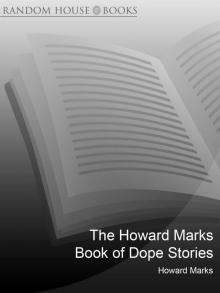 The Howard Marks Book of Dope Stories
The Howard Marks Book of Dope Stories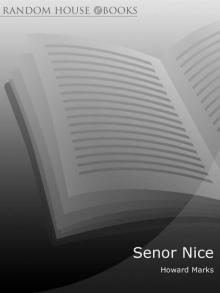 Senor Nice: Straight Life From Wales to South America
Senor Nice: Straight Life From Wales to South America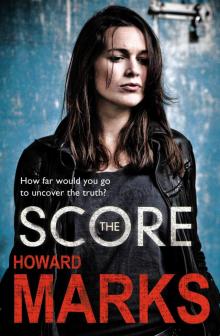 The Score
The Score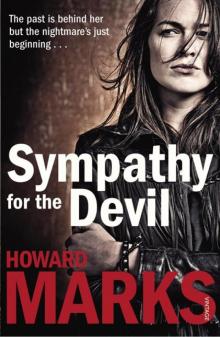 Sympathy for the Devil
Sympathy for the Devil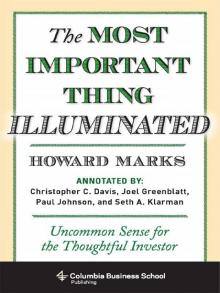 The Most Important Thing Illuminated
The Most Important Thing Illuminated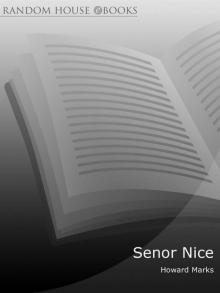 Senor Nice
Senor Nice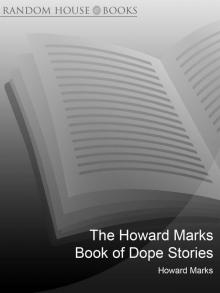 Howard Marks' Book of Dope Stories
Howard Marks' Book of Dope Stories